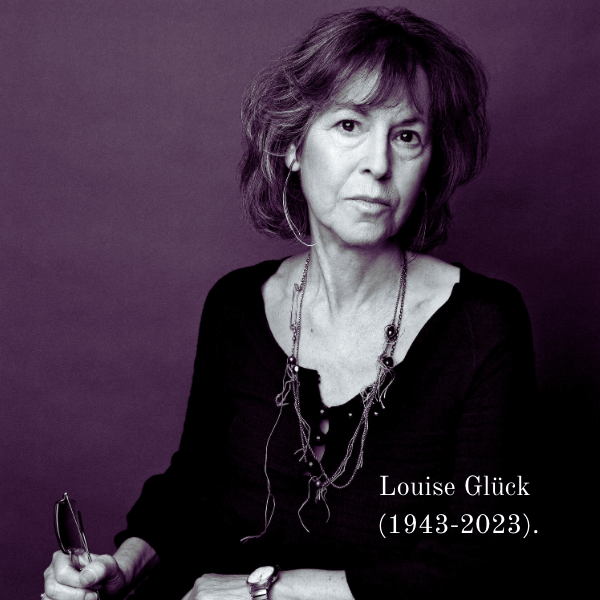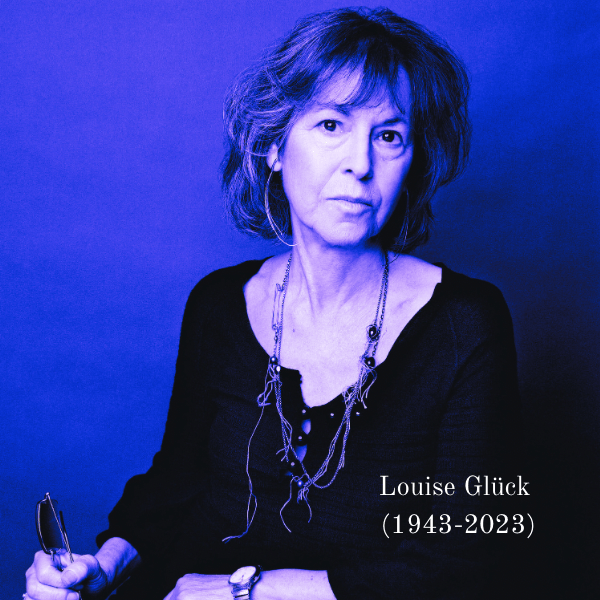Louise Glück gana el Prestigioso Premio Tomas Tranströmer, 2020.
«Este Premio -comenta el Jurado- se otorga a Louise Glück, «Por una poesía de gran precisión y oscura negritud, cuyo sonido personal se hace eco de la banda sonora de la mitología y la historia». El Premio Tomas Tranströmer fue instituido por la Ciudad de Västerås en 1997 para honrar al poeta Tomas Tranströmer que vivió en Västerås entre 1965 y el año 2000. Se otorga cada dos años y el monto del premio es de 200,000. Coronas Suecas, el equivalente a 20.000,00 Dólares. Tomas Tranströmer fue miembro permanente del jurado mientras vivió. El objetivo del Premio es «recompensar un alto nivel de autoría en el espíritu de Tomas Tranströmer». Algunos ganadores han sido: Inger Christensen, Dinamarca en 2004. Lars Gustassson, Suecia. en 2006. Kjell Espmark, Suecia en 2010. Lasse Soderberg, Suecia, 2014. Sirkka Turkka, Finlandia en 2016. Eva Runefelt, Suecia en 2018 y en 2020: Louise Gluck. El Premio se entregará el 25 abril de 2020 en La Sala de Conciertos de Västerås por el Presidente de La Junta Municipal: Anders Teljebäck. El Premio Tomas Tranströmer 2020, fue anunciado el 20 de febrero. Fuente: https://www.svt.se/nyheter/lokalt/vastmanland/poeten-louise-gluck-far-transtromerpriset-2020
Louise Glück, EEUU. (1943-2023). Publicó su primer libro en 1968: Firstborn. Autora de doce libros de poesía. Fue Miembro de la Academia Americana de las Artes y las Letras. Premio Pulitzer de Poesía, 1993. por El iris salvaje, (publicado por Pre-Textos, en 2006), Premio: William Carlos Williams. Premio Fundación Lannan, Poeta Laureada en los años (2003-2004). Premio Nacional del Libro, 2014. Premio del Círculo Nacional de Críticos del Libro y Premio Bollingen de Poesía. En 2020, Ganó también el prestigioso Premio: Tomas Tranströmer, Y se alzó con el codiciado Premio Nobel de Literatura 2020. Tres poemarios de Glück han sido traducidos al sueco: Averno (2017), Ararat (2019) e Iris salvaje (2020). Enseñó en las universidades de Yale y Stanford y vivió en Cambridge, Massachusetts.

Un Mito de Devoción Cuando Hades decidió que amaba a esta chica construyó para ella un duplicado de tierra, todo igual, hasta el prado, pero con una cama añadida. Todo igual, incluida la luz del sol, porque a una joven le resultaría difícil ir tan rápido de la luz brillante a la oscuridad absoluta. Gradualmente, pensó, presentaría la noche, primero como sombras de hojas que revoloteaban. Entonces la luna, luego las estrellas. Entonces no hay luna, no hay estrellas. Permita que Persephone se acostumbre lentamente. Al final, pensó, lo encontraría reconfortante. Una réplica de la tierra, excepto que había amor aquí. ¿No todos quieren amor? Esperó muchos años, construyendo un mundo, mirando Perséfone en el prado. Perséfone, un fundidor, un catador. Si tienes un apetito, pensó, los tienes a todos. ¿No todos quieren sentir en la noche el amado cuerpo, la brújula, la estrella polar, para escuchar la respiración tranquila que dice que estoy vivo, eso significa también que estás vivo, porque me escuchas, estás aquí conmigo? Y cuando uno se da vuelta, el otro se da vuelta ... Eso es lo que siente, el señor de la oscuridad, mirando el mundo que ha construido para Perséfone. Nunca se le pasó por la cabeza que aquí no oliera más, que ciertamente ya no comiera. ¿Culpa? ¿Terror? El miedo al amor? Estas cosas que él no podría imaginar; ningún amante los imagina. Él sueña, se pregunta cómo llamar a este lugar. Primero piensa: El Nuevo Infierno. Entonces: el jardín. Al final, él decide llamarla Girlhood de Persephone. Una suave luz que se eleva sobre el nivel del prado, detrás de la cama. Él la toma en sus brazos. Él quiere decir que te amo, nada puede hacerte daño, pero él piensa que esto es una mentira, por lo que dice que al final estás muerto, nada puede herirte, lo que le parece un comienzo más prometedor, más cierto. ********* A Myth of Devotion When Hades decided he loved this girl he built for her a duplicate of earth, everything the same, down to the meadow, but with a bed added. Everything the same, including sunlight, because it would be hard on a young girl to go so quickly from bright light to utter darkness Gradually, he thought, he'd introduce the night, first as the shadows of fluttering leaves. Then moon, then stars. Then no moon, no stars. Let Persephone get used to it slowly. In the end, he thought, she'd find it comforting. A replica of earth except there was love here. Doesn't everyone want love? He waited many years, building a world, watching Persephone in the meadow. Persephone, a smeller, a taster. If you have one appetite, he thought, you have them all. Doesn't everyone want to feel in the night the beloved body, compass, polestar, to hear the quiet breathing that says I am alive, that means also you are alive, because you hear me, you are here with me. And when one turns, the other turns— That's what he felt, the lord of darkness, looking at the world he had constructed for Persephone. It never crossed his mind that there'd be no more smelling here, certainly no more eating. Guilt? Terror? The fear of love? These things he couldn't imagine; no lover ever imagines them. He dreams, he wonders what to call this place. First he thinks: The New Hell. Then: The Garden. In the end, he decides to name it Persephone's Girlhood. A soft light rising above the level meadow, behind the bed. He takes her in his arms. He wants to say I love you, nothing can hurt you but he thinks this is a lie, so he says in the end you're dead, nothing can hurt you which seems to him a more promising beginning, more true.


